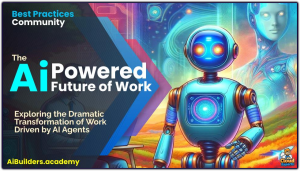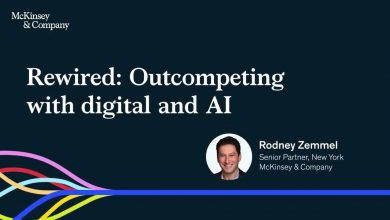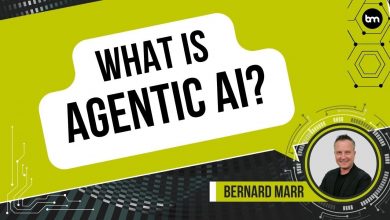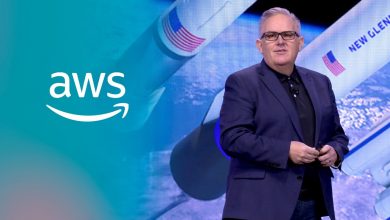Ai Agents and the Future Work
Exploring The Digital Transformation of Work: Harnessing the AI Workforce Revolution and The Augmented Future.
 In an exclusive interview Microsoft’s CEO Satya Nadella discusses the company’s move into the world of Artificial Intelligence and whether AI will displace workers.
In an exclusive interview Microsoft’s CEO Satya Nadella discusses the company’s move into the world of Artificial Intelligence and whether AI will displace workers.
AI is rapidly changing the landscape of work and AI agents are revolutionizing how tasks are performed, presenting profound implications for the future of work itself.
In their riveting first episode of Leaders of AI podcast, Julia McCoy and Dave Shapiro unpack these developments, exploring how 2025 will be the “Year of the Agent,” with autonomous AI systems set to transform every industry, followed by mass robot deployment in 2026 and the dawn of superintelligence by 2027.
The hosts share personal insights about how AI is already revolutionizing creative work, and serving as both a wake-up call and a practical guide for viewers, emphasizing that success in the AI age isn’t about replacing human creativity but augmenting it with new tools.
The AI-Powered Organization: Harnessing the AI Workforce Revolution and The Augmented Future
AI agents are intelligent systems that can perform tasks autonomously, analyze data, and provide insights to enhance decision-making processes. Their impact on work is profound.
AI can automate repetitive tasks, allowing employees to focus on more strategic and creative work, can process vast amounts of data at incredible speeds, leading to faster and more accurate results, and can analyze complex data sets and provide valuable insights to support decision-making processes.
Agents can identify patterns and trends that humans may overlook, sparking innovation and new opportunities, and as AI become more integrated into workplaces, the future workforce will undergo significant transformation, including upskilling and reskilling, human collaboration with AI, new job roles and workplace dynamics.
 Mike Walsh, CEO of Tomorrow, a global consultancy on designing companies for the 21st century, explores Generative AI and the Future of Work, and in this talk a broader picture of Ai-enabled transformation overall.
Mike Walsh, CEO of Tomorrow, a global consultancy on designing companies for the 21st century, explores Generative AI and the Future of Work, and in this talk a broader picture of Ai-enabled transformation overall.
Mike is a visionary in the field of The AI-Powered Organization, where he says ChatGPT and the rise of generative AI platforms are just the beginning of a much bigger algorithmic revolution that is set to reshape the future of work itself.
The future of work is bigger than AI chatbots, remote work, or the inevitable arrival of some kind of corporatized metaverse. True – technology is changing how we do things, but that is only part of the story.
There has always been a creative dynamic between new tools and the impact that has on the nature of work. Think about electricity. Over a century ago, this new energy source represented not only a new way of powering factories, but as Henry Ford would demonstrate with his moving assembly line innovation, a different way of thinking about designing work environments and processes as well.
The Digital Transformation of Work: Harnessing the AI Workforce Revolution and The Augmented Future
We can view this trend within an overall context of a broader digital transformation of work, that encompasses many other aspects including skills and culture.
Dion Hinchcliffe, a renowned expert in digital transformation and enterprise IT strategy, has shared valuable insights on the future of work, emphasizing that the digital transformation of work involves more than just implementing new technologies. It requires a fundamental shift in how organizations operate and how employees collaborate and communicate. The integration of digital tools and platforms enables greater flexibility, efficiency, and innovation in the workplace.
In the digital age, continuous learning and upskilling are essential for both organizations and individuals. Hinchcliffe emphasizes the need for organizations to invest in employee training programs that focus on digital skills and emerging technologies. Additionally, individuals must take ownership of their learning journey and actively seek opportunities to acquire new skills to remain relevant in the evolving job market.
Generative AI is poised to play a significant role in the future of work, according to Hinchcliffe. While it presents exciting opportunities, it is crucial to address the associated challenges and ensure responsible and ethical use. As this technology continues to evolve, it will reshape industries, empower workers, and unlock new possibilities.
Dr Mark van Rijmenam, a Strategic Futurist Digital Speaker, describes the overall theme as one of “The AI Workforce Revolution: The Augmented Future“. He explores various aspects of the of the ‘Augmented Workforce‘, how AI is augmenting human capabilities and enabling organizations to automate repetitive tasks, improve efficiency, and make data-driven decisions.
He also addresses the concerns and challenges associated with the AI workforce revolution, discussing issues such as job displacement, ethical considerations, and the need for upskilling and reskilling the workforce to adapt to the changing landscape. He emphasizes the importance of continuous learning, collaboration between humans and AI, and the need for ethical frameworks to guide AI implementation.
In this video Gerd Leonhard discusses the future of work and jobs in the era of artificial intelligence, exploring the potential impact of AI on various industries and provides insights into how the world might look like by 2030.
Leonhard discusses how AI is likely to replace certain jobs that involve repetitive tasks and data analysis, however he also emphasizes that AI will create new opportunities and jobs that require human skills such as creativity, empathy, and critical thinking. He suggests that individuals should focus on developing skills such as emotional intelligence, adaptability, and complex problem-solving, as these skills are less likely to be automated.



